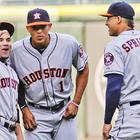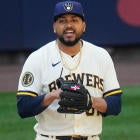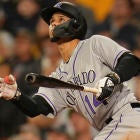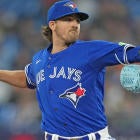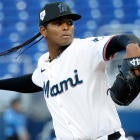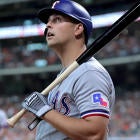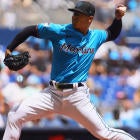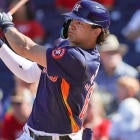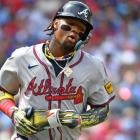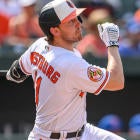At long last, it's over. Houston, that nefarious hoarder of prospects while averaging 104 losses from 2011 to 2014, is fully committed to the now.
Its actions over the past 18 months reveal as much. The Astros dealt three of those prospects for Evan Gattis prior to last season and two more, including maybe their best in Brett Phillips, for Carlos Gomez and Mike Fiers at the deadline. It proved to be just enough to nudge them into the playoffs for the first time in 10 years.
The most striking deal, though, came this offseason, when after several failed attempts to acquire a dominant bullpen arm, they finally gave in to the Phillies' demands and surrendered their two most major league-ready arms, the strikeout-happy Vincent Velasquez and the so-far-underwhelming Mark Appel, for the largely unproven Ken Giles.
It was a hefty price to pay, but it gives the Astros arguably the deepest bullpen in the majors, featuring six pitchers -- Luke Gregerson, Will Harris, Tony Sipp, Josh Fields and Pat Neshek, in addition to Giles -- with late-inning stuff. Only expected contenders devote so much of their resources to protecting leads.
The irony is that the players the Astros have acquired in those deals -- omitting Giles, of course, who remains to be seen -- haven't been much help so far. Gomez maintains a high profile but was alarmingly unproductive last year. He was banged up, sure, but as an undisciplined hitter on the wrong side of 30, his best is probably behind him. Gattis, if he's not catching, is a dime-a-dozen plodder in the mold of Mark Trumbo who handcuffs the Astros by occupying their DH spot. Fiers is a fine middle-of-the-rotation option but likely had the element of surprise going for him in 2014 and is back down to earth now.
To be fair, though, those three are only intended to be complementary pieces to the Astros' young nucleus. They did at least wait until their best prospects graduated to sell the farm. Carlos Correa and George Springer have already joined Jose Altuve as early-round royalty in Fantasy, and reigning AL Cy Young winner Dallas Keuchel, despite his lack of pedigree, has proven to be a true ace.
Beyond him, Collin McHugh is a reclamation project gone right, even if he came down to earth a little last year, and Lance McCullers may have had the most underrated rookie season of anyone, emerging as arguably the Astros' second-best pitcher. They'll be asking a lot of him in 2016, which is dangerous given his limited workload so far, but they have little recourse after trading Velasquez and Appel away. Fortunately, with that deep bullpen, the Astros can afford a hole in their starting rotation, should one arise.
2016 projected lineup
1. Jose Altuve, 2B
2. George Springer, RF
3. Carlos Correa, SS
4. Carlos Gomez, CF
5. Colby Rasmus, LF
6. Evan Gattis, DH
7. Luis Valbuena, 3B
8. Jason Castro, C
9. Jon Singleton, 1B
Bench: Jake Marisnick, OF
Bench: Marwin Gonzalez, IF/OF
2016 projected rotation
1. Dallas Keuchel, LHP
2. Lance McCullers, RHP
3. Collin McHugh, RHP
4. Mike Fiers, RHP
5. Doug Fister, RHP
Alt: Scott Feldman, RHP
2016 projected bullpen
1. Ken Giles, RHP
2. Luke Gregerson, RHP
3. Will Harris, RHP
4. Tony Sipp, LHP
5. Josh Fields, RHP
First, you need to understand that "buyer beware" doesn't mean "do not draft." Correa is more likely than not to be far and away the best player at far and away the weakest position, and if he picks up where he left off last year, yeah, he probably deserves to be the fifth player taken. But selecting him there as opposed to late in the first round or early in the second is taking on risk at the point in the draft when you can least afford it. For as good of a prospect as Correa was, he wasn't the first of his kind, and others like him -- Jason Heyward, Eric Hosmer and Wil Myers, to name a few -- faltered as sophomores after taking the league by storm as rookies. It's a strong enough trend that you have to tweak your expectations for Correa, if only slightly.
Having been rescued from Philadelphia, the best up-and-coming closer in the game is now with a team that will provide him with regular save opportunities. No need to wonder if his strikeout potential will make up for his lack of chances. On chances alone, he has the potential to be a top-five closer. But there is that strikeout potential that puts him at 11.7 per nine innings now 115 2/3 innings into his big-league career. True, his WHIP last year was kind of high because of some control issues, but he had gotten on track by the time he inherited the closer role in late July and, from that point forward, delivered a 1.71 ERA, 0.95 WHIP and 11.3 strikeouts per nine innings in 24 appearances. Sounds like Craig Kimbrel, Aroldis Chapman, Kenley Jansen and Wade Davis have company.
Does anyone actually think the Astros are going to stick with Jon Singleton at first base all season? Maybe the reason they believe they can do that while otherwise selling out for the here and now is because they already have a fallback option in place. As prospects go, Reed is hardly a household name, but you don't see too many minor-leaguers put up the numbers he has. The ones who do are usually fueled by one of the two extreme hitter's leagues -- in Reed's case, the California League -- and deserving of skepticism. Reed, though, maintained the same level of production at Double-A Corpus Christi of the neutral Texas League, batting .332 with 11 home runs and a .976 OPS in 205 at-bats. It reminds me of Paul Goldschmidt, who himself didn't catch the attention of prospects hounds until he left the California League, and we all know how he turned out.
Prospects report
With all the trades the Astros have made over the last 18 months, their farm system is no longer the pride of baseball, but they had so much depth to begin with that they're not exactly depleted. Beyond Reed, here are some of the biggest names.
• Michael Feliz got a look last year when the Astros were desperate for bullpen help, but the 22-year-old could use more time in the minors and profiles as a starter long term. He touches 97 mph with his fastball and is beginning to learn how to command his three-pitch arsenal.
• Last year's second overall pick, Alex Bregman, is as safe as you'd expect for a player drafted that high, earning comparisons to Dustin Pedroia for his polished approach and moderate power. The only problem is the Astros are already full up the middle.
• Tony Kemp had to move to the outfield for the same reason, but his bat profiles better at second base. What he lacks in power he makes up for in on-base ability and speed.
• Colin Moran can hit, but does he have enough power to measure up at third base? His nine homers in 366 at-bats at Double-A last year were a step in the right direction, and Luis Valbuena isn't much of a road block.



















